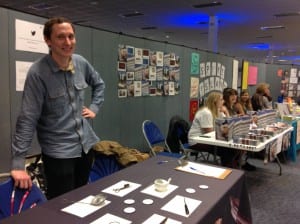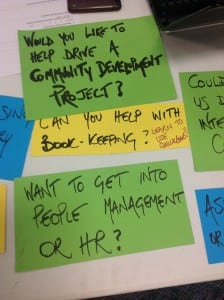Our museums, our voices
Posted on by Fay Curtis.
Naif Pierre, Volunteer Coordinator
 We’re one of nine museums across the country taking part in the Paul Hamlyn Foundation Our Museum programme. It asks how museums work in active partnership with their local communities through sustainably sharing decision-making, networks and skills.
We’re one of nine museums across the country taking part in the Paul Hamlyn Foundation Our Museum programme. It asks how museums work in active partnership with their local communities through sustainably sharing decision-making, networks and skills.
In essence, we’re asking if and how museums represent the voice of others in the way they work and in the work museums produce. As part of Bristol’s Our Museum programme, we recently went along to the Univeristy of the West of England (UWE) volunteering fair, to recruit some fresh new faces to join our family of volunteers. We also posed this important question to stall holders, students and on Twitter:
Should museums be spaces for social justice?
Here are some responses:
 “Yes, it’s really important to give people a voice.” Erica, student from Hong Kong.
“Yes, it’s really important to give people a voice.” Erica, student from Hong Kong.
“No, it’s not as subjective as that – there is the danger of favouring one voice over another, there are always contradictory opinions.” Mark, Erica’s housemate, also a student from Hong Kong.
“Yes.” Julie from Windmill Hill City Farm.
 “Yes, but it needs to be very clear that the voice you’re representing is not your own, that it comes from the community.” Fraisia, Volunteer Co-oridnator at Arnolfini.
“Yes, but it needs to be very clear that the voice you’re representing is not your own, that it comes from the community.” Fraisia, Volunteer Co-oridnator at Arnolfini.
“Absolutely!” Mike from Happy City has worked with the Happy Museum Project unpicking how communities interact with their local museums.

“Yes, definitely.” Dr Cezara Nanun from Bristol Woman magazine.
“It’s not clear at first how a museum would be a space for social justice, but I definitely think museums should be spaces for people to have a voice.” Natalie, from Envision Bristol and Tiger Bristol.
“Yes, but what does that mean?” Tony Butler, Director of the Museum of East Anglian Life.
 This is a pertinent question that we and the other museums participating in the Our Museum programme are trying to answer. Should museums be spaces for people to have a voice, spaces for social justice? How does that pan out in practice? What are the practical benefits and challenges? These are all questions we are grappling with as part of this exciting programme.
This is a pertinent question that we and the other museums participating in the Our Museum programme are trying to answer. Should museums be spaces for people to have a voice, spaces for social justice? How does that pan out in practice? What are the practical benefits and challenges? These are all questions we are grappling with as part of this exciting programme.
Join the conversation
 This isn’t a question solely for museums or people interested in museums. It’s part of a wider conversation on people and their relationship with institutions. David Flemming, Director of National Museums Liverpool, also recently asked “What does social justice mean to you?”
This isn’t a question solely for museums or people interested in museums. It’s part of a wider conversation on people and their relationship with institutions. David Flemming, Director of National Museums Liverpool, also recently asked “What does social justice mean to you?”
What do you think? Share your opinions, thoughts, comments and questions – we’d love to hear what you think. You can leave a comment below or tweet us @bristolmuseum using #OurMuseum. How do museums involve their local communities in sharing networks, developing skills and decision making?